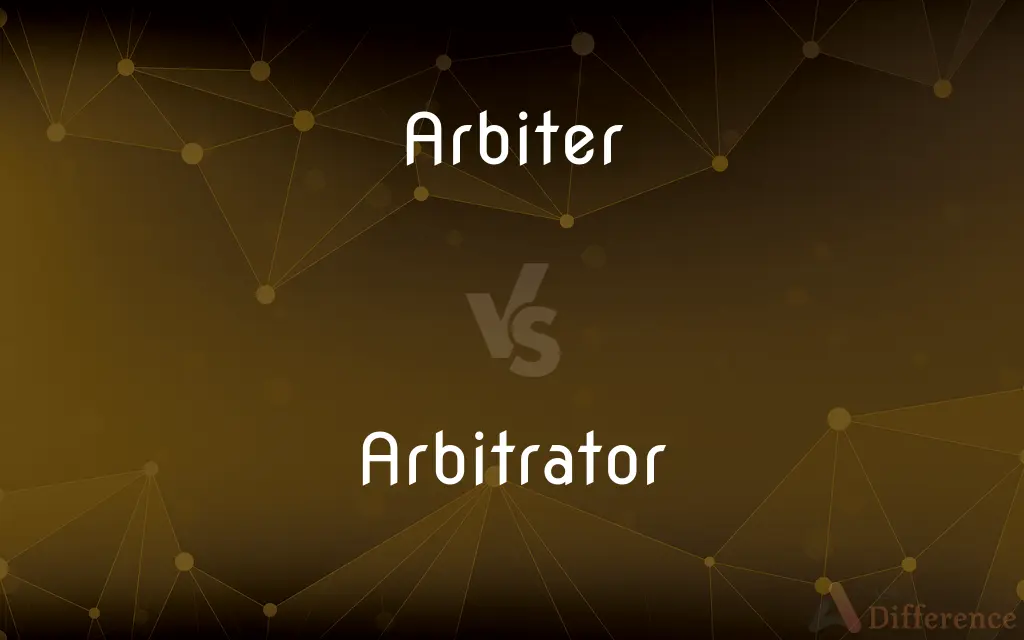Arbiter vs. Arbitrator — What's the Difference?
By Urooj Arif & Fiza Rafique — Updated on March 12, 2024
An arbiter is a person who settles disputes or makes judgments, while an arbitrator is specifically appointed to resolve legal disputes outside of court.

Difference Between Arbiter and Arbitrator
Table of Contents
ADVERTISEMENT
Key Differences
Arbiters have a broader role, often involved in making decisions in various contexts, not limited to legal disputes. In contrast, arbitrators focus on legal conflicts, acting within the framework of arbitration agreements.
While the term "arbiter" can imply a voluntary or informal decision-maker, an "arbitrator" is formally appointed based on legal provisions or agreements. On the other hand, arbitrators are chosen by the disputing parties or by an appointing authority to ensure a fair resolution process.
Arbiters may not always follow strict legal procedures, allowing for more flexibility in decision-making. Whereas arbitrators are bound by specific rules and laws pertinent to arbitration, ensuring a structured resolution process.
The decisions of an arbiter might be advisory or final based on the context, while the decisions (awards) of an arbitrator are legally binding and enforceable, similar to court judgments.
Comparison Chart
Definition
Person who settles disputes or makes judgments
Person appointed to resolve legal disputes outside of court
ADVERTISEMENT
Scope
Broader, can involve various decision-making contexts
Specifically focused on legal disputes
Formality
Can be informal or voluntary
Formal, based on legal provisions or agreements
Legal Binding
Decisions may be advisory or final depending on the context
Decisions (awards) are legally binding and enforceable
Procedures
May not follow strict legal procedures
Bound by rules and laws pertinent to arbitration
Compare with Definitions
Arbiter
Arbiters make decisions in a range of contexts, not just legal.
The committee acted as an arbiter in the competition.
Arbitrator
Arbitrators are formally chosen based on agreements or legal provisions.
The parties selected a well-known lawyer as their arbitrator.
Arbiter
Arbiters can operate informally, without strict rules.
The school principal served as an arbiter in student disputes.
Arbitrator
Arbitrators specifically handle legal disputes outside of court.
The arbitrator was appointed to resolve the contract dispute.
Arbiter
Arbiters can be chosen based on trust or expertise.
The retired judge was asked to be an arbiter in the community issue.
Arbitrator
Arbitrator decisions are legally enforceable.
The arbitrator's award was accepted by both parties as final.
Arbiter
Arbiter decisions might not always be final.
The consultant's advice was taken as an arbiter's opinion.
Arbitrator
Arbitrators operate within a defined legal context.
The arbitrator's role was defined by the arbitration clause in the contract.
Arbiter
Arbiters operate in various non-legal and legal contexts.
The expert in the field was the final arbiter on the matter.
Arbitrator
Arbitration follows specific legal rules and procedures.
The arbitrator conducted hearings in accordance with the arbitration agreement.
Arbiter
One agreed upon or appointed to judge or decide a disputed issue; an arbitrator.
Arbitrator
A person agreed upon or appointed to judge or decide a disputed issue; an arbiter.
Arbiter
One whose opinion or judgment is considered authoritative or worthy of respect
An arbiter of fashion.
Arbitrator
A person to whom the authority to settle or judge a dispute is delegated.
Arbiter
A person appointed, or chosen, by parties to determine a controversy between them; an arbitrator.
Arbitrator
A person, or one of two or more persons, chosen by parties who have a controversy, to determine their differences. See Arbitration.
Arbiter
A person or object having the power of judging and determining, or ordaining, without control; one whose power of deciding and governing is not limited.
Television and film, not Vogue and similar magazines, are the arbiters of fashion.
Arbitrator
One who has the power of deciding or prescribing without control; a ruler; a governor.
Though Heaven be shut,And Heaven's high Arbitrators sit secure.
Masters of their own terms and arbitrators of a peace.
Arbiter
(electronics) A component in circuitry that allocates scarce resources.
Arbitrator
Someone chosen to judge and decide a disputed issue
Arbiter
(transitive) To act as arbiter.
Arbiter
A person appointed, or chosen, by parties to determine a controversy between them.
Arbiter
Any person who has the power of judging and determining, or ordaining, without control; one whose power of deciding and governing is not limited.
For Jove is arbiter of both to man.
Arbiter
To act as arbiter between.
Arbiter
Someone with the power to settle matters at will;
She was the final arbiter on all matters of fashion
Arbiter
Someone chosen to judge and decide a disputed issue
Common Curiosities
Are arbiter decisions always binding?
Arbiter decisions can be advisory or final depending on the context, unlike arbitrator decisions which are legally binding.
What is an arbiter?
An arbiter is a person who makes decisions or settles disputes in a range of contexts, not limited to legal matters.
Who is an arbitrator?
An arbitrator is a specialized individual appointed to resolve legal disputes outside of court, following specific arbitration rules.
What qualifications are required for an arbitrator?
Arbitrators are often required to have legal expertise or specialized knowledge pertinent to the dispute they are resolving.
Can arbitration decisions be appealed?
Arbitration decisions are generally final and binding with very limited grounds for appeal, focusing on fairness and adherence to the agreed arbitration process.
Is arbitration a legal process?
Yes, arbitration is a formal legal process that results in binding decisions and is an alternative to court litigation.
How does the role of an arbiter differ from that of an arbitrator?
The arbiter's role is broader and can be less formal, involving decision-making in various contexts, while an arbitrator specifically resolves legal disputes with binding decisions.
Can anyone be an arbiter?
While arbiters can come from various backgrounds, their appointment often depends on their expertise, trustworthiness, or the specific requirements of the situation.
How are arbitrators selected?
Arbitrators can be chosen by the disputing parties, through mutual agreement, or by an appointing authority if parties cannot agree.
What happens if an arbiter's decision is not followed?
The enforceability of an arbiter's decision depends on the context and agreement of the parties involved. It may not have the same legal weight as an arbitrator's award.
Share Your Discovery

Previous Comparison
Shed vs. Hut
Next Comparison
Se vs. SelAuthor Spotlight
Written by
Urooj ArifUrooj is a skilled content writer at Ask Difference, known for her exceptional ability to simplify complex topics into engaging and informative content. With a passion for research and a flair for clear, concise writing, she consistently delivers articles that resonate with our diverse audience.
Co-written by
Fiza RafiqueFiza Rafique is a skilled content writer at AskDifference.com, where she meticulously refines and enhances written pieces. Drawing from her vast editorial expertise, Fiza ensures clarity, accuracy, and precision in every article. Passionate about language, she continually seeks to elevate the quality of content for readers worldwide.














































